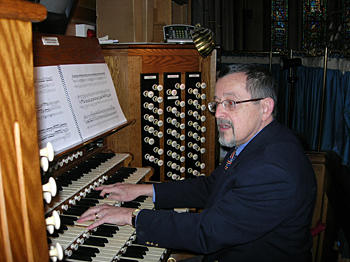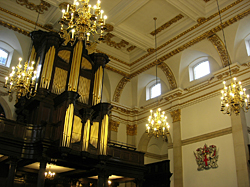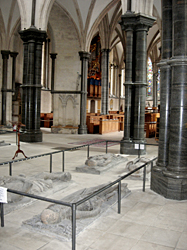Herman was in London directing a Winter Session music/theatre course, “800 Years of Pageantry: Arts and Architecture of the English Monarchy,” and had previously been invited by the organists of the two churches to give the recitals while in the city. His performances included two premieres of organ music, the first by renowned British modern composer Francis Routh and the second by Jennifer Margaret Barker, UD associate professor of music.
Routh composed a setting of Alma Redemptoris Mater, Opus 76, a Mariann antiphon. It was the day after the composer's 80th birthday when the piece was played for the first time publicly at Herman's recital in the Church of St. Lawrence. Routh was present for the recital, and the performance of his music was a birthday gift to him, Herman said.
In 1980, Routh had written a book on the history of English organ music. Herman said he was so impressed by the book that he sought Routh out and knocked on his door, and this was the beginning of a long friendship. Routh's Opus 76 is the third of his major organ works dedicated to Herman. Herman has premiered another work by Routh at St. Thomas Episcopal Church in New York and has played his compositions in Westminster Cathedral and in Dublin.
The Church of St. Lawrence is located next to London's historic Guildhall, Herman said, and is the official church of the Lord Mayor and the Corporation of the City of London.The second recital featured a composition, Effigies by Barker, who was a William Penn Fellow at the University of Pennsylvania where she received master's and doctoral degrees in composition. Barker recently received an “established professional, music composition” fellowship from the Delaware Division of the Arts. Her music has been performed in Asia, Australia, Europe and North America, and she has received numerous commissions from musical groups and has recorded two CDs.
Effigies was written especially for Herman's recital at Temple Church, consecrated in 1185 and the second oldest church building in London. The church, built in the round after the Church of the Holy Sepulcher in Jerusalem, was founded by the Knights Templar, an order of crusading monks who protected pilgrims traveling to and from Jerusalem in the 12th century. Effigies of many of the knights are found on its floor.
Barker did research on the Knights Templar and wrote Effigies, a tone poem celebrating their triumphs and trials. Herman included the piece in his recital on campus in February.
Herman has given recitals in churches in Germany, Scotland, Wales, Ireland and England, including the four most historic cathedrals in London--Westminster Abbey, St. Paul's Cathedral, Westminster Cathedral and Southwark Cathedral.
He recorded a CD, Music by Samuel Wesley, at Coventry Cathedral. He is currently working on a forthcoming CD, playing the Jefferson Pipe Organ in Bayard Sharp Hall and featuring music written by German composers Jan Bender, Herman's teacher at Wittenberg University in the 1960s, and Bender's teacher, Hugo Distler.Article by Sue Moncure





